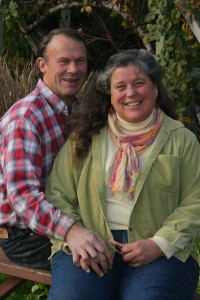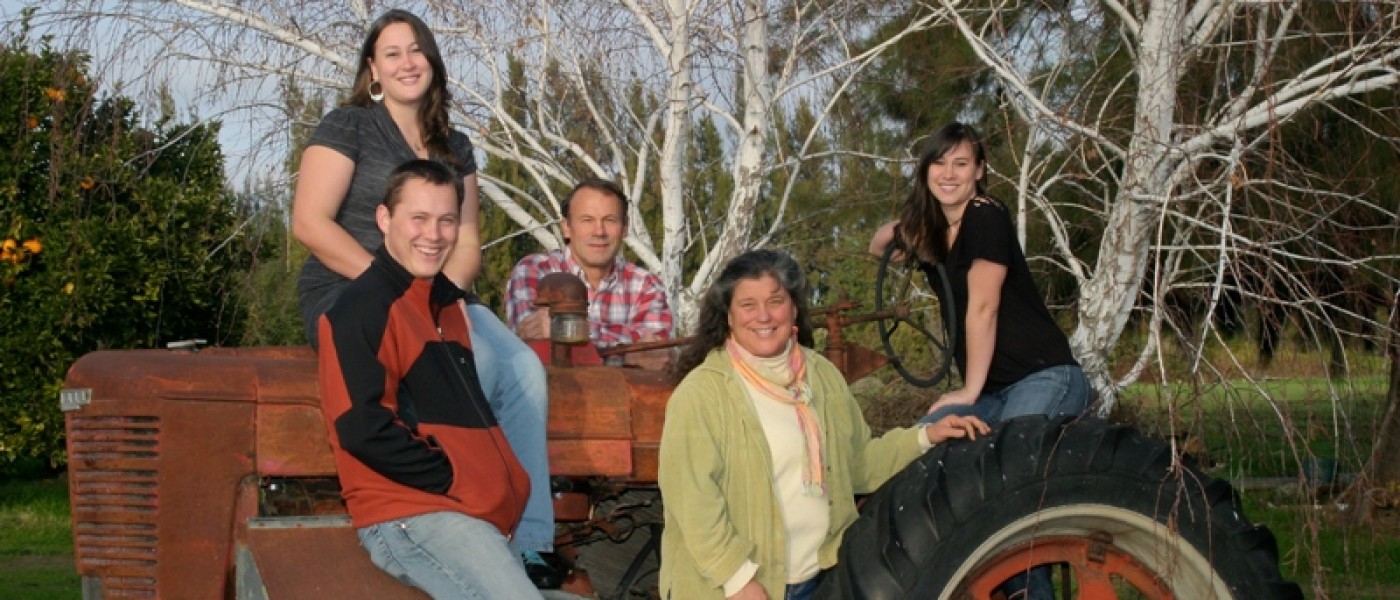Though they never thought farming would become their career, Jeff and Annie Main were never strangers to agriculture. Together the Mains have owned Good Humus Produce for 40 years and have become part of the vibrant farming community in Yolo County, California. Now they look to the future.
As a child, Annie spent summers and holidays at her grandmother’s family farm. Jeff grew up in the midst of California corporate farming, working summers for the canning company for which his father was a district superintendent. The two didn’t find their passion for farming, however, until they moved into “Agrarian Effort,” a house for students interested in alternative forms of agriculture at the University of California, Davis. At UC Davis, Annie and Jeff majored in renewable natural resources and civil engineering, respectively. When they moved into the “Agrarian Effort,” the Mains joined a group of people that helped spark the Davis Food Co-op, a cooperative buying club that began in 1972 before formally opening the Davis Food Coop in 1976. Additionally, Jeff and Annie were one of three families that started the Davis Farmers’ Market at that time. In 1976, Good Humus Produce began as a collaboration among those same three families.
By 1978, the Mains were working towards greater, more widespread change in agriculture, joining the movement to revitalize organic certification in California. Jeff and Annie were part of a statewide group of farmers that were farming organically and wanted certification for the practice. The group revived and re-energized California Certified Organic Farmers (CCOF) to structurally change the way a farm achieved organic status. Members of the renewed CCOF codified a set of statewide member-initiated rules supporting, monitoring and certifying less-invasive agricultural methods. Initiated by theRodale Institute in 1972, CCOF had begun with just 54 members. Due to the efforts of charismatic leaders such as Amigo Bob Cantisano and Warren Weber, and with the strong support of farmers such as the Mains, by 1979 the California Organic Food Act was signed, legally stating the criteria a farmer must adhere to in order to be certified organic in the state. “Sometime in the late ’70s it got to a point where you saw it was really possible to farm organically in a larger way,” Jeff said. “The tools were there and the attitude among the public was beginning to be there.”
 In 1980, the families that started Good Humus split up to start separate farming endeavors. Jeff and Annie carried on the Good Humus name. Since then, Jeff and Annie have built extensively on the 20 acres of land that make up Good Humus Produce, building a house and barn and planting acres of many different varieties of organically-certified fruit and vegetables. To the Mains that is not enough; they have hopes of infrastructure for animals and housing for the staff on the farm. “There was a period of time where it was kind of depressing,” Annie said. “You have this ideal image of a successful farm in your mind, but then Jeff and I realized that it takes more than one lifetime to build a farm.” Which leads to their goal for the future: to ensure the hard work and values they put into Good Humus will provide a solid foundation, even as they retire from farming themselves, for generations to come.
In 1980, the families that started Good Humus split up to start separate farming endeavors. Jeff and Annie carried on the Good Humus name. Since then, Jeff and Annie have built extensively on the 20 acres of land that make up Good Humus Produce, building a house and barn and planting acres of many different varieties of organically-certified fruit and vegetables. To the Mains that is not enough; they have hopes of infrastructure for animals and housing for the staff on the farm. “There was a period of time where it was kind of depressing,” Annie said. “You have this ideal image of a successful farm in your mind, but then Jeff and I realized that it takes more than one lifetime to build a farm.” Which leads to their goal for the future: to ensure the hard work and values they put into Good Humus will provide a solid foundation, even as they retire from farming themselves, for generations to come.
The nature of agriculture makes it difficult for an older farm owner to feasibly transfer land ownership to a non-family young farmer without the young farmer assuming a large debt liability. This is a hurdle for new farmers as well as existing farmers like Annie and Jeff, who want to ensure that their farm lives on as a farm, and continues to provide food for the local community. Agricultural easements are an important tool for dealing with this challenge. An easement is typically purchased from the original landowner by a land trust with government funds, but the recent economic state of the nation has limited such funding. The Mains wrote the easement for their land, requiring that the land be farmed sustainably, that the farmer live on the land and at least half of the farmer’s income must be derived from the land. The innovative restrictions, high value of the easement, and the small size of the farm made it unreasonable for a land trust to purchase it directly. As a result, for the easement to be effective, Jeff and Annie needed another way to raise the funds necessary to purchase the easement. Despite the best efforts of the Mains and the mentoring of the pioneering thinkers at Equity Trust of Turners Falls, Massachusetts, at the end of eight years of effort they had about a third of the necessary funds and the first draft of an easement.
“You have this ideal image of a successful farm in your mind, but then Jeff and I realized that it takes more than one lifetime to build a farm.”
When the general manager of the Sacramento Natural Food Coop heard the about Jeff and Annie’s predicament, he suggested the Mains meet with the co-ops in the area to brainstorm fundraising methods. The Davis Food Co-op signed on and the Columbia Foundation provided a grant to the group to get their efforts off the ground and One Farm at a Time was born. One Farm at a Time is an effort to help keep farms and farmland by raising money to preserve small working farms, beginning with Good Humus. The first event to kickoff the fundraising efforts was hosted in the orchards of Good Humus, a dinner for community members under the apricot trees that raised $25,000 for Jeff and Annie’s cause. Since then, the co-ops have continued to market fundraising for One Farm at a Time and hold small fundraising dinners at the co-ops. Filmmaker Chuck Schultz of Blueprint Productions has documented the process in his film The Last Crop (click here to watch a trailer). Until it is officially released, Schultz holds special viewings of the film around California to raise funds for the organization. So far, One Farm at a Time has raised $200,000 toward the cause. “It has turned into a really nice chance for an empowerment of a local population in their own food security,” Jeff and Annie said.
Those involved with One Farm at a Time are hopeful that Good Humus Produce is just the beginning of their work. After the Good Humus easement is purchased, Jeff and Annie want to spread the experience to other farms in Yolo County and wherever family farmers face the challenge of land succession. The Mains hope that One Farm at a Time will become a model for farmers all over the country who want to protect their farmland for future generations. They feel that each person should know there are farms with similar stories everywhere, and there is a sense of individual and community empowerment behind partnering to support those farms through the local food system. “Every dollar spent can be a dollar of change,” Annie said.
In addition to One Farm at a Time, the Mains hope to promote future change through children’s education. Annie has partnered with the National Farm to School Network to show children the true experience of being on a farm, closing the gap between developed society and the natural world. Children who visit the farm through the program have the opportunity to pick and eat food, go to the farmers market, participate in a scavenger hunt, engage in discussions about farming and follow the watershed to see the importance behind how much water a farm must use. Annie explained that she wants the children to love the farm and see farming as a viable career path for the future. “The more emissaries, the better,” Annie said.
While their work is far from complete, Jeff and Annie have already sparked change throughout Yolo County. From starting farmers markets and advancing organic agriculture to preserving farmland and educating the next generation, the Mains’ legacy will certainly live on with the Good Humus land.
Further Reading
- This month’s Ask Farm Aid column answers a reader question, “I’ve been farming for five years and am looking to purchase land in my area. The problem is I can’t find anything affordable. Land goes for thousands of dollars an acre out here! Why is it so difficult to find affordable land these days?“
- For resources to find food from family farmers in your area, check out our Find Good Food page.



